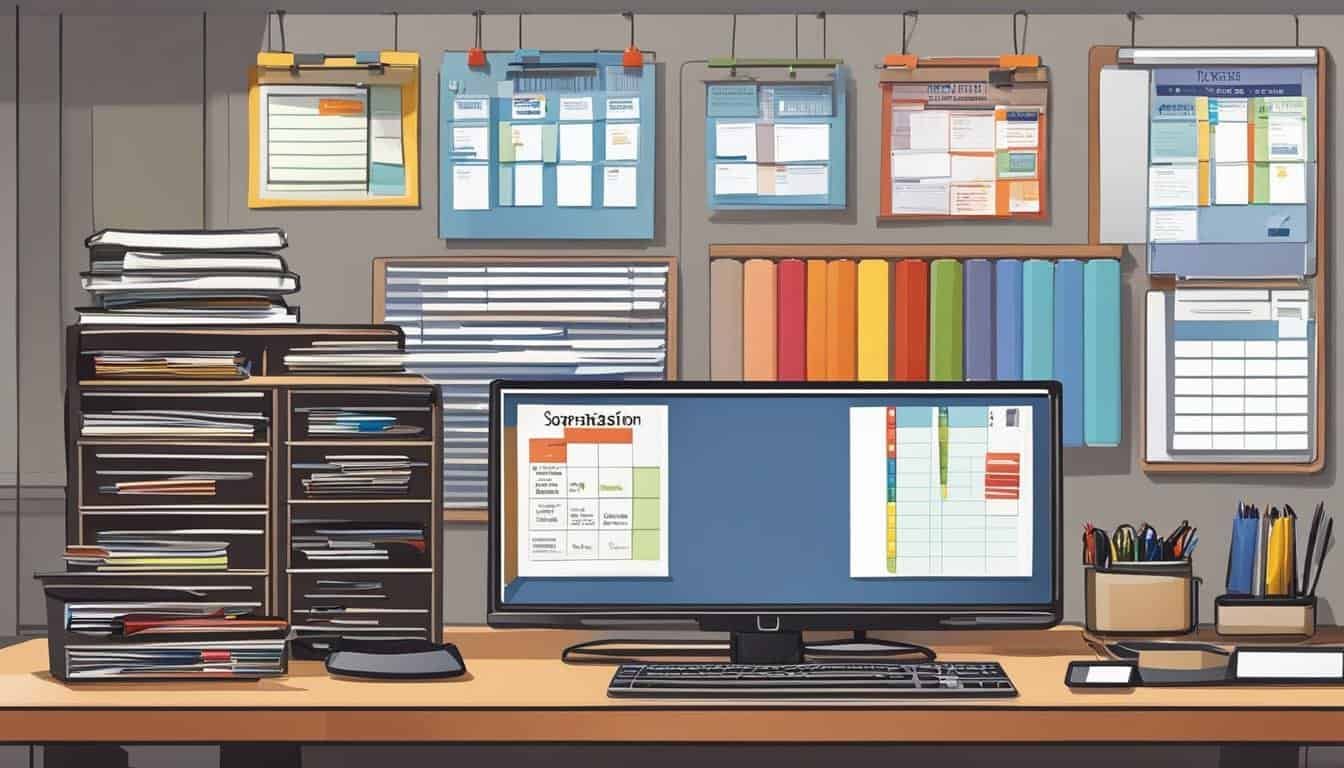Skills of an Office Manager
Office managers play a crucial role in driving efficiency and success in today’s fast-paced business environments. They are responsible for a wide range of tasks and must possess a variety of skills to excel in their role.
Effective office management skills are vital to ensure smooth operations and maximize productivity. In addition to administrative skills, office managers need to cultivate various other abilities to thrive in their role.
Key Takeaways:
- Office managers are important for driving efficiency and success in modern workplaces.
- They require a diverse set of skills, including administrative skills, decision-making, problem-solving, process management, organizational skills, leadership, communication, time management, multitasking, teamwork, collaboration, business acumen, and flexibility.
- By possessing these essential skills, office managers can excel in their careers and contribute to the overall effectiveness of their organizations.
Decision Making and Problem-Solving
Office managers possess a crucial set of skills that enable them to navigate the fast-paced nature of their role and drive success within their organizations. Two key skills that office managers must excel in are decision-making and problem-solving.
Decision-making skills are essential for office managers to effectively handle the multitude of choices they face on a daily basis. Whether it’s making strategic decisions that impact the overall direction of the organization or making operational decisions that streamline processes, office managers must possess the ability to analyze situations, evaluate options, and make informed decisions that align with the organization’s objectives.
Similarly, problem-solving skills are vital for office managers to address challenges and obstacles that arise in the workplace. They must be adept at identifying problems, understanding their root causes, and developing effective solutions that add value to the organization. Office managers must also handle these issues calmly and professionally, fostering a positive work environment while working towards resolutions.
“Good decision-making and problem-solving skills are the foundation of effective office management. These skills enable office managers to navigate challenges, make informed choices, and ultimately contribute to the success of the organization.”
Developing strong decision-making and problem-solving skills involves a combination of critical thinking, analysis, creativity, and effective communication. Office managers should leverage their expertise, industry knowledge, and understanding of organizational objectives to make decisions and solve problems that align with the broader scope of the company.
By enhancing their decision-making skills, office managers can make sound choices that optimize resources, improve efficiency, and drive overall success. Likewise, honing problem-solving skills empowers office managers to address issues promptly, implement effective solutions, and foster a positive work environment characterized by continuous improvement and growth.
Benefits of Strong Decision Making and Problem-Solving Skills
Having strong decision-making and problem-solving skills equips office managers with several benefits, including:
- The ability to address issues proactively, leading to improved productivity and organizational efficiency.
- The capacity to make informed choices that align with the organization’s mission, values, and strategic objectives.
- The skill to evaluate risks and rewards when faced with complex decisions, resulting in better outcomes.
- The aptitude to adapt to changing circumstances and handle unforeseen challenges effectively.
- The competence to foster a collaborative and innovative work environment by encouraging critical thinking and creative problem-solving among team members.
Strong decision-making and problem-solving skills are crucial for office managers to navigate the complexities of their roles, contribute to the organization’s success, and lead their teams towards achieving common goals.
Process Management and Organizational Skills
Office managers play a critical role in driving efficiency and success by excelling in process management and organizational skills. These skills are essential for developing and maintaining efficient systems that propel the business forward. Attention to detail is crucial as office managers oversee various tasks, ensuring the smooth operation of everyday office processes and organizing large projects.
Effective process management involves analyzing existing workflows and procedures. By conducting thorough assessments, office managers can identify areas for improvement and implement changes to enhance productivity. This involves streamlining processes, eliminating redundancies, and implementing automation solutions where applicable.
Organizational skills are vital in maintaining order and structure within the workplace. Office managers need to effectively manage time, resources, and information. This includes coordinating schedules, prioritizing tasks, and allocating resources efficiently. A well-organized office ensures that employees can work efficiently, resulting in increased productivity and reduced stress.
Key Elements of Process Management and Organizational Skills
- Analyzing existing processes to identify inefficiencies
- Implementing improvements and streamlining workflows
- Developing efficient systems and procedures
- Coordinating schedules and managing time effectively
- Prioritizing tasks and allocating resources efficiently
- Ensuring clear communication and collaboration
By excelling in process management and organizational skills, office managers contribute to smoother operations, increased productivity, and enhanced overall efficiency. With their attention to detail and ability to create efficient systems, office managers play a vital role in driving success in the modern workplace.
Next, we will explore the importance of leadership and communication skills for office managers. These skills enable them to effectively lead their teams and collaborate with various stakeholders to achieve organizational goals.
Leadership and Communication
Effective leadership and strong communication skills are essential for office managers to succeed in their role. As leaders, they must take responsibility for themselves and their team, guiding them towards the achievement of organizational goals. By possessing the necessary leadership skills, office managers can create a positive and productive work environment.
Office managers must communicate effectively with individuals at all levels of the organization. This includes adapting their communication style to suit different personalities and backgrounds, ensuring that messages are clear and easily understood. Clear and efficient communication fosters collaboration, encourages teamwork, and helps build strong relationships with colleagues and stakeholders.
“Great leaders are not born, they are made. They develop leadership skills through practice, experience, and continuous learning.”
By honing their leadership and communication skills, office managers can inspire their team members, motivate them to perform at their best, and resolve conflicts effectively. They can also convey information and expectations clearly, ensuring that everyone is on the same page and working towards common objectives. Moreover, effective leadership and communication skills enable office managers to act as a bridge between senior management and their team, facilitating the flow of information and fostering a sense of belonging.
Benefits of Leadership and Communication Skills for Office Managers
- Foster teamwork and collaboration
- Build strong relationships with colleagues and stakeholders
- Motivate and inspire team members
- Resolve conflicts and address issues effectively
- Ensure clear and efficient communication within the organization
- Bridge the gap between senior management and the team
| Leadership Skills | Communication Skills |
|---|---|
| Ability to inspire and motivate team members | Adaptability in communication style |
| Conflict resolution and problem-solving | Effective listening and feedback |
| Decision-making and accountability | Clarity and conciseness in conveying information |
| Delegation and empowerment | Non-verbal communication and body language |
Time Management and Multitasking
Effective time management and multitasking skills are essential for office managers to handle the diverse range of responsibilities they face on a daily basis. With multiple priorities and urgent deadlines, it is crucial for office managers to prioritize tasks efficiently and meet deadlines consistently.
By honing their time management skills, office managers can allocate their time effectively to different projects and responsibilities. This ensures that important tasks are completed on time, and no critical deadlines are missed. Efficient time management allows office managers to stay organized, reduce stress, and achieve optimal productivity in their role.
Multitasking is another crucial skill that office managers must possess. They are often required to handle numerous responsibilities simultaneously, balancing competing priorities and ensuring that all tasks are completed efficiently. Multitasking enables office managers to juggle various projects, manage schedules, and address colleagues’ urgent questions promptly.
“Good time management means having a clear understanding of what needs to be done and scheduling your time accordingly. It helps you stay focused, meet deadlines, and achieve your goals.”
To assist with time management and multitasking, office managers can utilize various tools and techniques. These may include implementing task management software, creating detailed to-do lists, using calendars and scheduling tools, setting realistic deadlines, and delegating tasks when necessary. By leveraging these resources, office managers can optimize their productivity and effectively manage their workload.
Benefits of Time Management and Multitasking
The benefits of strong time management and multitasking skills extend beyond meeting deadlines and completing tasks efficiently. These skills enable office managers to:
- Maximize productivity: By effectively managing their time and multitasking, office managers can accomplish more in a day, boosting overall productivity.
- Improve efficiency: Prioritizing tasks and multitasking allows office managers to work efficiently, minimizing time spent on less critical activities.
- Reduce stress: By effectively managing their time and workloads, office managers can reduce stress levels, leading to improved job satisfaction and well-being.
- Enhance organization: Strong time management skills help office managers stay organized and ensure that all tasks and projects are accounted for and completed in a timely manner.
Comparison of Time Management and Multitasking Skills
| Time Management | Multitasking | |
|---|---|---|
| Definition | The ability to allocate time effectively, prioritize tasks, and meet deadlines. | The capability to handle multiple tasks simultaneously by efficiently switching between them. |
| Key Skills |
|
|
| Benefits |
|
|
Developing and honing time management and multitasking skills can significantly benefit office managers in their quest for efficiency, productivity, and success. By managing their time effectively and multitasking efficiently, office managers can stay on top of their responsibilities, make the most of their valuable resources, and contribute to the overall success of their organization.
Teamwork and Collaboration
Office managers possess a set of essential skills to excel in their role, and among these skills, teamwork and collaboration play a vital role. Strong teamwork skills enable office managers to build effective partnerships with their colleagues, fostering a culture of collaboration and mutual support.
By working together towards common goals, office managers can harness the collective intelligence and diverse perspectives of their team members. This collaboration allows for the sharing of ideas and opinions, resulting in innovative solutions and enhanced decision-making.
Creating a positive office culture is another crucial aspect of teamwork and collaboration. Office managers actively promote open communication, respect, and trust among team members. This nurturing environment encourages employees to feel valued, motivated, and empowered, ultimately leading to increased productivity and job satisfaction.
To further enhance teamwork and collaboration, office managers can leverage various collaboration tools and technologies. These tools streamline communication, facilitate knowledge sharing, and encourage seamless collaboration across different teams and departments. From project management software to messaging apps and video conferencing platforms, these technology-driven solutions enable efficient collaboration and contribute to the overall success of the business.
Implementing effective teamwork and collaboration strategies not only strengthens the bond between office managers and their teams but also drives organizational success. By fostering a culture of teamwork and collaboration, office managers can unlock the full potential of their teams, leading to increased creativity, improved problem-solving, and ultimately, achieving shared goals.
| Benefits of Teamwork and Collaboration: | Examples: |
|---|---|
| Enhanced problem-solving capabilities | Collaboratively identifying and resolving complex issues |
| Increased creativity and innovation | Brainstorming sessions and cross-functional collaboration leading to new ideas |
| Improved communication and information sharing | Regular team meetings and use of collaborative tools for seamless communication |
| Efficient resource allocation | Collaborative planning and coordination of tasks, minimizing duplication of efforts |
| Stronger relationships and trust among team members | Teambuilding activities and fostering a supportive work environment |
Business Acumen and Flexibility
Office managers play a crucial role in driving efficiency and success in modern workplaces by possessing a combination of business acumen and flexibility. These two essential skills allow them to navigate the dynamic and competitive business landscape effectively.
Business Acumen: Understanding the Organization
To make informed decisions that align with the organization’s goals, office managers must have a deep understanding of the business they work in. This involves comprehending the company’s objectives, industry dynamics, and operations. By possessing this knowledge, office managers can identify opportunities for growth, make strategic decisions, and contribute meaningfully to the overall success of the organization.
The Role of Flexibility
Flexibility is a crucial skill for office managers due to the diverse and ever-changing nature of their responsibilities. They handle multiple priorities, adapt to changing circumstances, and adjust their approaches accordingly. Whether it involves managing unexpected challenges, addressing shifting business needs, or supporting team members during demanding periods, office managers must demonstrate flexibility to ensure optimal outcomes.
By combining business acumen and flexibility, office managers become versatile professionals who can effectively respond to the demands of their role. They bring a strategic mindset, adaptability, and a proactive approach to their daily activities, contributing significantly to the success of the organization.
“Business acumen and flexibility are two key traits that separate exceptional office managers from the rest. The ability to understand the business and navigate through its complexities, coupled with the agility to adapt to changing circumstances, allows office managers to excel in their role and drive sustainable results.”
Benefits of Business Acumen and Flexibility
Office managers with strong business acumen and flexibility bring several advantages to the organization:
- Strategic decision-making: By understanding the business landscape, office managers can make well-informed decisions that contribute to the company’s growth and success.
- Adaptability and resilience: Flexibility enables office managers to adapt quickly to changing environments, overcome challenges, and find innovative solutions.
- Efficiency and productivity: Business acumen and flexibility allow office managers to optimize processes, streamline operations, and maximize efficiency.
- Effective communication: Understanding the organization’s objectives helps office managers communicate effectively with different stakeholders, fostering better collaboration and alignment.
- Leadership and influence: Business acumen and flexibility enable office managers to lead by example, inspire others, and drive positive change within the organization.
Conclusion
Office managers are essential assets in today’s fast-paced workplaces, employing their skills in decision-making, process management, communication, and leadership to optimize organizational effectiveness. Their ability to multitask, collaborate with teams, and adapt to changing circumstances enables them to meet the dynamic demands of their role with finesse. By possessing these essential skills, office managers can not only thrive in their careers but also drive their organizations towards greater success.
The skills of an office manager encompass a wide range of capabilities, and each skill plays a vital role in ensuring smooth operations and efficient outcomes. With their strong decision-making abilities, office managers can identify and resolve issues promptly, effectively addressing the ever-changing challenges of the modern workplace. Their expertise in process management and organizational skills allows them to streamline operations, maximize productivity, and ensure that tasks are executed with precision.
Furthermore, office managers exhibit exceptional leadership and communication skills, fostering an environment of open dialogue and trust within their teams. Through their clear and efficient communication, they facilitate effective collaboration among team members, enabling the realization of shared goals and objectives. Additionally, their adeptness in time management and multitasking ensures that tasks are prioritized efficiently, deadlines are met, and colleagues’ urgent needs are addressed promptly.
Ultimately, office managers possess a valuable combination of business acumen and flexibility. Their comprehensive understanding of the organization’s objectives and operations allows them to align their decision-making with the company’s overall vision. Moreover, their ability to adapt to change and remain flexible in the face of evolving circumstances ensures that they can navigate the dynamic landscape of the modern workplace successfully. With their impressive array of skills, office managers contribute significantly to the growth and success of their organizations.







